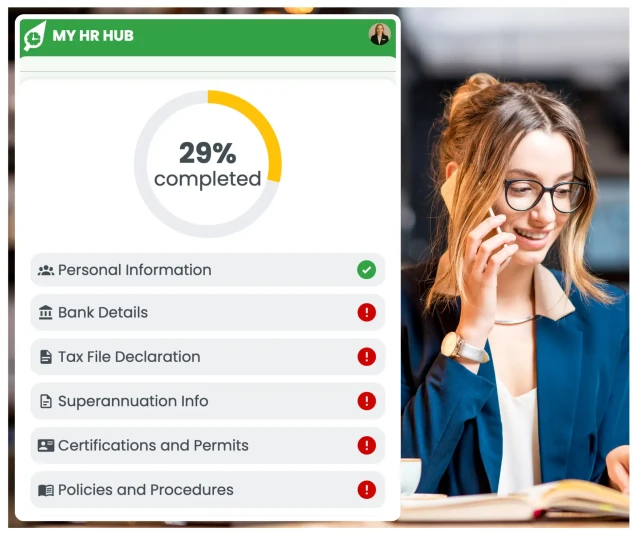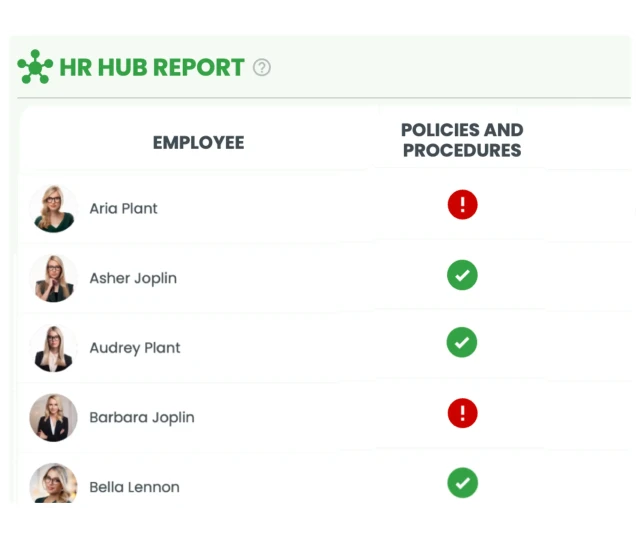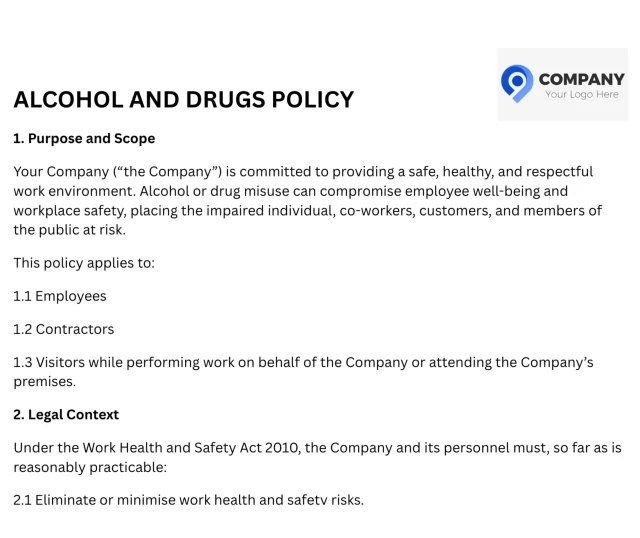
In many Australian workplaces, policies and procedures still live in folders, PDFs, or email attachments that rarely get read—let alone acknowledged. HR teams print pages, staff sign a paper, and the document disappears into a filing cabinet. When regulators, insurers, or the Fair Work Ombudsman request proof that everyone read the latest WHS or Code of Conduct update, the scramble begins.
RosterElf’s policy acknowledgement software replaces that chaos with an instant, auditable system. From one dashboard, HR or managers can upload a new policy, assign it to the right group of employees, and trigger notifications. Staff receive a clear message—via email, app, or My HR Hub—that a new policy is ready to review. With a single tap, they confirm acknowledgement, and RosterElf timestamps the action automatically.
That timestamp is more than a convenience. Under Australian Fair Work and Work Health and Safety (WHS) laws, employers must show that staff were made aware of policies and had reasonable access to them. Digital acknowledgement satisfies that requirement. Every acceptance is stored with the date, time, version, and employee ID, creating a permanent audit trail.
The workflow is simple but powerful:
1. Upload or create a policy – Import your existing documents or start with one of RosterElf’s pre-built templates.
2. Assign recipients – Choose individuals, departments, or entire locations.
3. Set reminders – RosterElf automatically notifies employees until they acknowledge.
4. Track progress – Live dashboards show who has read what and highlight overdue acknowledgements.
5. Export records – Generate PDF or CSV reports for audits, investigations, or board meetings.
Because the platform is cloud-based, you can manage compliance for multiple sites without emailing attachments or relying on store managers to collect signatures. Every employee—whether on shift, remote, or casual—has equal access and accountability.
1. Save time — no manual distribution, printing, or follow-up.
2. Increase compliance — automated reminders lift completion rates.
3. Reduce risk — timestamped acknowledgements prove due diligence under Fair Work and WHS.
4. Improve transparency — staff and managers always see the same record.
RosterElf’s workplace policies and procedures software gives SMEs the sophistication of enterprise compliance tools—without complexity or cost.
Policy acknowledgement isn’t about bureaucracy; it’s about clarity and protection. When expectations are documented and traceable, culture strengthens and disputes decline.
RosterElf integrates acknowledgement tracking seamlessly into your broader HR lifecycle — from hiring to rostering to payroll — keeping compliance airtight and effortless.

In most small businesses, HR communication breaks down because staff don’t have one central place to see everything that applies to them. A new hire might receive a Code of Conduct on paper, a safety policy via email, and a uniform policy at orientation — then lose track.
RosterElf fixes that with My HR Hub, a digital home where each employee can see every active and completed policy in one place. When a new or updated policy is released, they receive a push notification and an email link. The Outstanding section makes it clear what needs action, while completed acknowledgements remain visible for transparency.
This structure encourages self-management. Employees take responsibility for their own compliance instead of relying on HR follow-ups. They can access the Hub on desktop, tablet, or mobile, making it ideal for industries like hospitality, retail, and healthcare where staff are rarely at a desk.
From an HR perspective, this also means no more juggling spreadsheets or email chains. Managers instantly see who has acknowledged what and can filter by role, location, or policy type.
Beyond convenience, the My HR Hub improves policy engagement. Staff can open and re-read policies anytime, keeping standards top of mind and reinforcing company culture.
By giving employees ownership, RosterElf turns compliance from a chore into a shared responsibility — a hallmark of modern, transparent HR practice.

In Australia, employers have a legal duty to keep workers informed about workplace rights, safety procedures, and conduct expectations. The Fair Work Ombudsman and Safe Work Australia both require employers to prove that these policies were distributed and acknowledged.
RosterElf simplifies that process. Its audit-ready policy acknowledgement system keeps every confirmation securely stored and tied to each employee’s record. When auditors request evidence, HR can export a full trail showing policy name, version number, timestamp, and acknowledgement status.
The system also supports version control — every time a policy is updated, employees are automatically prompted to re-acknowledge the new version. This ensures old acknowledgements aren’t mistaken for current ones, closing a critical compliance gap that most paper systems overlook.
Compliance doesn’t just protect you from penalties; it builds trust. Staff know that their employer values transparency and accountability. That clarity fosters confidence across your workforce — from head office to the frontline.
RosterElf turns compliance from a reactive process into a proactive routine, embedding Fair Work and WHS awareness into daily operations.

Many small and medium businesses struggle to create compliant HR policies. Outsourcing to HR consultants or lawyers can cost thousands, and free templates found online rarely meet Fair Work standards.
RosterElf bridges that gap with pre-built, Fair Work–aligned HR policy templates that you can adapt instantly. Choose from categories like safety, conduct, social media, and leave. Each is written in plain language and structured to meet WHS and Fair Work Act requirements.
Once you’ve customised them for your business, you can assign them to staff and start tracking acknowledgements immediately. No external tools, no separate document management software — it’s all built into your HR Hub.
The result is professional-grade compliance without the price tag. You maintain full control over your policies and can update them anytime, ensuring your documentation evolves with your business.

HR dashboards give you a bird’s-eye view of compliance across all sites and departments. Filters let you drill down by team, role, or location. When someone hasn’t acknowledged a policy, the system automatically sends reminders until completed — keeping you compliant without constant admin.
You can also schedule regular compliance reports to be emailed automatically, so management always has visibility of progress. During audits or incident reviews, those reports become instant evidence of your organisation’s diligence.
By combining automation with detailed reporting, RosterElf ensures nothing slips through the cracks — freeing HR teams to focus on people, not paperwork.
Don’t just take our word for it—see why businesses rate RosterElf the clear winner over Deputy and Connecteam. ? Browse verified Xero reviews and start your free 15-day trial today.
Enjoy the simplicity of a user-friendly interface that makes creating and managing rosters a breeze.
Learn moreManage your rosters on-the-go with intuitive mobile apps for both iOS and Android devices.
Learn moreTrack labour costs and budgets in real-time to ensure cost-effective staffing solutions.
Learn moreEnhance team communication with instant notifications and updates for all roster changes.
Handle shift swaps effortlessly with features that ensure adequate coverage and flexibility.
Learn moreStreamline your scheduling process by using and copying templates for quick and consistent roster creation.
Learn more
At RosterElf, we're passionate about our customers. Our team of rostering experts is dedicated to providing unlimited support, whether you're setting up or using our software long-term.